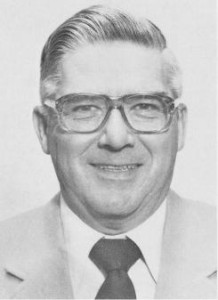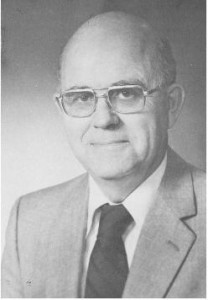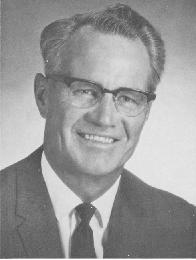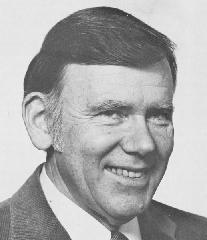1981 Honorary Life Member Selections
 J. EWING CAMPBELL
J. EWING CAMPBELL
J. Ewen Campbell was born at Graham’s Road, Prince Edward Island, where he received his primary education. He entered Prince of Wales College, in Charlottetown, but his education was interrupted from 1941 until 1945 when he joined the Royal Canadian Air Force as navigator or observer (tour of operations in coastal command overseas). He was discharged with the rank of flight lieutenant. After the war he finished his secondary education at Prince of Wales College and graduated with his B.Sc. (AGE) from McGill University and also with his M.Sc. (plant pathology) from McGill.
He joined the work force at the Research Station, Agriculture Canada, Charlottetown, as plant pathologist. He served in this capacity for 16 years. He then joined the staff of Seed Potato Certification, Agriculture Canada, as officer-in-charge on September 1, 1966, a position he holds to the present time. He has been involved in many segments of the agricultural community and has served as Provincial Secretary of the Agriculture Institute of Canada, chairman of the Atlantic Region Potato Evaluation Committee, chairman and member of the National Potato Breeding Advisory Committee.
He is a member of the Prince Edward Island Institute of Agrology as well as a member of the Canadian Phytopathological Society. He was a member of the Advisory Committee of the Plant Disease Eradication Act and a member of the Prince Edward Island Elite Seed Farm Committee, and has assisted in supervising and giving direction to this farm since its infancy. He was an Extension pathologist with the Agriculture Research Station with emphasis on potatoes. Other activities include a member of the Air Force Association and a member of the church choir and the session in his local church for many years.
Ewen has been an island member and representative at the Potato Association of America over the years and a charter member of the Pathology Section. He has also attended the certification meetings as an island representative. He has served on the section committee this year and is cochairman of the local arrangements committee of the 65th Annual Meeting, which is just being completed.
Mr. President, ladies and gentlemen, I was a classmate of this man in 1946 and I have had the pleasant experience of working with him over the years in the potato industry and I have always found him to be a dedicated, cooperative, and sincere worker in the potato industry.
It is an honor and a privilege to introduce J. Ewen Campbell as a life member of The Potato Association of America.
Don G. Anderson, Nominator
 CHARLES E . CUNNINGHAM
CHARLES E . CUNNINGHAM
Members and friends of The Potato Association of America, it is my pleasure to present Charles E. Cunningham to you for Honorary Life Membership. Sharing the pleasure of this occasion with Charlie tonight is his wife Kitty, who is here, and their daughter Robyn and sons Kent and Craig.
Charlie is well known to the membership of this association because of his long and varied service to the association, to the potato industry, and to the potato research community. Even so, let me review with you the high points of his career. He was born in Washburn, Maine, as was his wife, so very naturally he chose to go to the University of Maine after his release from the U.S. Army in 1945, where he served three years of duty in the infantry. At Orono, in 1948, he earned a B.S. in agronomy with highest distinction. For one year he served as assistant manager of the Potato Seed Department of the Aroostook Potato Growers, Inc., in Presque Isle, Maine. Then he returned to the University of Maine where he earned his M.S. in agronomy in 1952. He joined the faculty of the Department of Agronomy at Maine where he was responsible for a broad range of potato research including variety evaluation, fertilizers, herbicides, cultural, and storage practices. He also taught the specialized courses in potato production.
In 1957, he joined Red Dot Foods in Madison, Wisconsin as potato breeder and agronomist. There he assisted the well known Dr. F.J. Stevenson in the potato breeding program to develop new varieties for potato chip processing. Among the products of this effort was Monona. His responsibilities also included recommendations for agronomic practices for the Red Dot production in Wisconsin and Alabama. While he was at Red Dot, he began his Ph.D. studies in genetics at the University of Wisconsin.
Upon completion of his degree in 1962, he was recruited by the Campbell Soup Company to work in the Campbell Institute for Agricultural Research. For 12 years he was leader of the Campbell potato breeding program. In those years he shared with others in the release of Wauseon and Lenape and built up a reservoir of valuable breeding lines and selections. In my association with Charlie, it seems to me those years gave him his most satisfaction for he was able to work directly with the crop and with the people who produce it. However, his capabilities as an administrator prompted the Campbell Soup Company to promote him first in 1974 to Director of Plant Breeding for all their breeding and variety evaluation programs, then in 1977 to Vice President in the Pioneer Research Laboratory. There his responsibilities were broadened to include physiology, pathology, biochemistry, and genetics, as well as breeding. From 1979 until this past April, he was Vice President for Vegetable research and Plant Breeding with responsibilities for programs in the U.S., Canada and other countries. In April the Institute of Agricultural Research was deactivated and Charlie became the Director of Vegetable Research in the Institute of Research and Technology.
During his career, Charlie has actively participated in this association. He has served as a Director, Secretary, Vice President, and was President in 1967-68. He also served as Associate Editor for two years and Editor of the Journal for two years. I am sure than many of you will recall the many years of dedicated effort John Campbell contributed as editor, business manager, and publisher of the Journal. It was an unsettling experience for John and the Society when he decided he could not continue these duties. Our society is most fortunate that Charlie agreed to fill this breech. Probably no one else in the membership had the confidence of the rest of the members and of John. This made the transition so much easier.
For all these contributions to the society and the potato industry, it is most appropriate that we honor Dr. Charles E. Cunningham with an Honorary Life Membership.
Robert L. Plaisted, Nominator
 JAY G. GARNER
JAY G. GARNER
Jay G. Garner was born December 18, 1919, at Sugar City, Idaho and was reared on a diversified crop and livestock farm. He received his elementary and secondary education in the local public schools.
In 1943, Jay graduated from the University of Idaho with a Bachelor of Science degree in Agronomy with a major in soil science and a minor in crop production. After graduation he served as an infantry unit commander in the European theater in World War II. He completed his military career in 1946 with the rank of Captain and was awarded the Purple Heart, Bronze Star, and Silver Star.
In March 1946, Jay was employed by the University of Idaho as an assistant County Extension Agent in Twin Fails County. In June he was transferred to Challis as the first County Extension Agent for Custer County. In 1951 he accepted the County Extension’s position in Fremont County.
Jay was appointed Extension Potato Specialist for southeastern Idaho in 1967 with headquarters at Blackfoot. This assignments involved service to all segments of the potato industry including growers, processors, shippers, and allied industries, and required close cooperation with the Idaho Crop Improvement Association personnel and the University of Idaho’s Research and Educational Departments.
In February 1980 Jay retired after 34 years of dedicated service to the University of Idaho’s Extension program, and has been granted status of Professor Emeritus. Currently he is an agricultural consultant for Winnemucca Farms, Winnemucca, Nevada.
The potato industry, not only in Idaho but in other areas as well, has certainly benefitted from Jay’s many years of teaching, demonstrating, and research. Jay’s rapport with people and his leadership ability have resulted in the application of many new and improved practices which have increased yields and improved the quality of Idaho potatoes.
Jay is the coauthor of 15 extension and scientific publications on potatoes. He has organized and directed many informative meetings with all segments of the potato industry and has had speaking participation in potato meetings in several states and provinces.
By invitation of the Western Australian Department of Agriculture, Jay took sabbatical leave from September 1974 until June 1975 to study and aid Australia’s potato culture and production program.
In Idaho he initiated the concept of area potato schools which have been well attended since 1969. He conducted extensive programs for potato bruise prevention, including soil management, timely final irrigation, vine killing, proper harvester operation, and better potato handling methods. He also sponsored an area-wide broadcast of monitored soil temperatures which ran through the harvest each fall.
Jay was involved extensively with research workers as a cooperator in research investigations in the control of potato diseases and insects, variety testing, weed control, and potato nutrition. He demonstrated the value of soil insecticides on yield, quality, and insect control, and conducted studies on the effects of planting dates, seed piece spacing, and nitrogen rates on hollow heart. Jay has demonstrated a willingness at any time to be of service to the potato industry in any way possible.
Jay has been an active member of The P.A.A. since 1968. He was a member of the Extension Committee, has served as chairman of the state, western regional, and national membership committees, and was the secretary of the local planning committee in 1972 when The P.A.A. meeting was held in Twin Falls, Idaho. He was a member of The P.A.A. Board of Directors from 1977 to 1980.
Jay and his wife, Zelda, have one daughter, Eve Datisman. Jay constitutes a plus for the potato industry and it is a pleasure to have him join the ranks of Honorary Members of PAA.
Earl F. Spencer, Nominator
 NORMAN S. “BUD” WRIGHT
NORMAN S. “BUD” WRIGHT
Norman Samuel Wright, better known by his childhood nickname of”Bud,” was raised in southwestern British Columbia on a family farm where the principal products were milk and potatoes. Bud’s interest in potatoes began as a boy on the farm and as a member of what is now called a 4-H Potato Club. Through club activities he met the late Haddan S. MacLeod, who was the federal inspector in charge of seed potato certification in British Columbia. Mr. MacLeod encouraged him to attend university and gave him summer employment as a seed potato field inspector. He gained experience by extensive travel in British Columbia and Alberta. Following graduation from high school in Richmond, B.C., he attended the University of British Columbia where he was trained in plant pathology.
He received the BSA and MSA degrees from U.B.C. in 1944 and 1946, respectively, and in 1946 was appointed to a newly-established Agriculture Canada Laboratory of Plant Pathology. This laboratory, which was on the U.B.C. campus, was later consolidated with Entomology, Pedology, and Virus Chemistry to become the Vancouver Research Station. Bud was responsible for potato disease research and in 1958 became Head of the Plant Pathology Section, a position which he still holds.
He obtained his Ph.D. from the University of California at Berkeley in 1952. On his return he married Ethel Shepherd.
Bud has always taken a keen interest in the work of his fellow scientists and technicians. Their work has been concerned mainly with virus, fungus, and nematode diseases of strawberry and raspberry. The Vancouver breeding program in these crops has produced varieties which are resistant to insects and diseases and are meeting the requirements of machine harvesting.
Dr. Wright’s own research has dealt with potato diseases. Significant contributions have been made to our understanding and control of witches’ broom, leafroll and the latent viruses, PVX and PVS. To date, he has published 25 scientific papers and 60 abstracts and miscellaneous articles. With co-workers Richard Stace-Smith, Frances MeUor and Ted Cole, he undertook the eradication of PVX and PVS from the potato varieties grown in Canada and USA. Virus-free clones were developed by heat therapy and meristem tip propagation. In recognition of the significance of their work the group was awarded the Public Service Merit Award in 1972.
Under his leadership, the seed stocks in Pemberton and Cariboo, the two seed potato control areas in British Columbia, were replaced with virus-free clones. The production programs in these use the latest technology in pathogen detection and control. The entire operation, from greenhouse grown stem cuttings, Elite I families, Elite II and Elite III production and all leaf sampling, is done by the seed growers themselves. The ultimate in closed systems has been achieved and the natural isolation of both areas has been utilized to avoid leafroll and other aphid-transmitted viruses. In British Columbia, the highest level of cooperation exists among the agencies and personnel involved in seed potato production, mainly because of Dr. Wright’s leadership and example.
Field trips to Pemberton have been arranged for The Potato Association of America and for many other groups of scientists and producers. Among the visitors this year will be a potato growers’ study tour from Australia. In addition to visits to the seed farms, visitors are impressed by the collection of virus-free varieties which is maintained in Pemberton. Accessions currently exceed 150 and include most, if not all, of the varieties of importance in Canada and the U.S.A. and the most promising recent selections from the breeding programs in our two countries. Seed tubers from the collection have been used to replace infected stocks in all provinces of Canada and have been sent on request to several states and to overseas countries including Australia, Holland~ and the U.S.S.R.
Bud is a memlaer of the Agriculture Institute of Canada, the B.C. Institute of Agrologists, and the American Phytopathological Society. He is a member and a past president of the Canadian Phytopathological Society and, of course, has been active in the affairs of The Potato Association of America. He has served as a Director and was President in 1977-78. He is a member of the Pathology Section and is currently serving on the membership committee and Editorial Board. In 1979 he was Chairman of the committee which arranged our annual meeting in Vancouver.
Mr. President, I am pleased to present Norman S. (Bud) Wright as a candidate for Honorary Life membership in the Potato Association of America. He has served as a Director and was President in 1977-78. He is a member of the Pathology Section and is currently serving on the membership committee and Editorial Board. In 1979 he was Chairman of the committee which arranged our annual meeting in Vancouver.
Mr. President, I am pleased to present Norman S. (Bud) Wright as a candidate for Honorary Life membership in the Potato Association of America.
Geoff Rowberry, Nominator